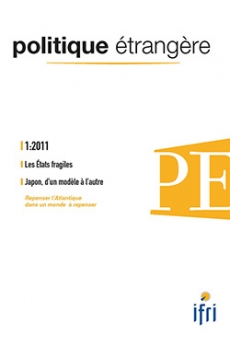
Politique étrangère n° 1/2011
Pour acheter ce numéro, contactez-nous
Recevez les numéros de l'année en cours et accédez à l'intégralité des articles en ligne.
L’effet d’entraînement des graves crises que connaissent certains États a conduit la communauté internationale à multiplier les tentatives d’aide au redressement. On peut pourtant s’interroger sur l’inadaptation de ces tentatives : dans leurs méthodes de travail, leur cadre conceptuel, dans leur philosophie même. Il faut sans doute pour l’avenir privilégier la reconstruction des institutions régaliennes, seules susceptibles de garantir la réorganisation sociale et le développement économique.
Experience shows that the social and economic crises or even civil wars associated with failing states have spillover effects on neighboring countries and affect regional stability. As the international community rightly takes a more active role in aiding states left behind by the advances of globalization, its interventions for the most part have been blundered and ineffective, with the Afghan disaster as the culmination. One must consider whether the working methods, conceptual framework or even the broader philosophy that guide these actions are not profoundly ill-adapted. Viable solutions must ultimately prioritize the rebuilding of modern state institutions that are necessary for social restructuring and economic development.